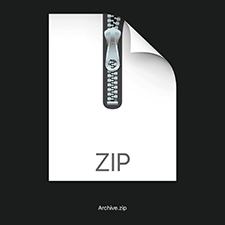Zip
Zip is a common type of file compression. "Zipping" one or more files creates a compressed archive that takes up less disk space than the uncompressed version. It is useful for backing up files and reducing the size of data transferred over the Internet.
An archive compressed with standard Zip compression has a .ZIP file extension — for example, Archive.zip. To open the file or files in a Zip archive, you must first "unzip" or decompress the archive. Both Windows and macOS include a built-in file decompression utility that can unzip Zip files. Alternatively, you can use a third-party file archiving application, such as WinZip or 7-Zip, to decompress a Zip file.
Zip Compression Ratio
How much a file can be compressed depends on the original data. For example, a plain text file can be compressed much more than a JPEG image file, since JPEG data is already compressed. Zipping a text file might generate an archive that is only 25% of the original file size, while a zipped JPEG file may still be 95% of its original size.
NOTE: "Zip" also refers to a removable storage device made by Iomega during the 1990s and early 2000s. The original Zip drive supported 100 megabyte removable Zip disks — significantly more than the 1.44 MB floppy disk alternative. Later models supported 250 and 750 MB disks. The popularity of Zip disks faded as hard drive costs declined and the storage capacity of portable flash drives increased.
 Test Your Knowledge
Test Your Knowledge